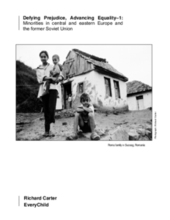This report addresses the very serious issues of prejudice and discrimination against minorities in central and eastern Europe and the former Soviet Union.
First, it discusses the history of nationalism both from a theoretical viewpoint and as it applies to central and eastern Europe and the former Soviet Union. The authors argue that nationalism is a relatively recent phenomenon and that the popular view of ‘age-old ethnic hatreds’ emerging from the straightjacket of communism is a dangerous myth – an oft-used excuse for doing a lack of intervention. The authors argue that nationalism is not inevitable, and the removal of communism was neither the cause nor the effect of nationalism. With new nations emerging that have no history of independence or democratic government, ethnicity has been seized upon by both rulers and ruled to act as a unifier for the new countries. This situation has been exacerbated by struggles over scarce resources – struggles that have taken on an ethnic colouring – which has wrongly implicated these issues as another example of ethnic conflict.
This report then examines the nature and extent of discrimination against minorities in the region with particular regard for the position of children. Ubiquitous increases in poverty and inequality have disproportionately affected ethnic and religious minority groups. The most serious prejudice has been aimed at the Roma, who have consequently suffered severe, sustained discrimination in all areas of their lives. Other groups have also suffered as a result of this prejudice.
The authors then review, country by country, the present situation of minorities in central and eastern Europe and the former Soviet Union, discussing their numbers and outlining the main threats that they face from the majority populations. The aim of this is to act as a resource for other organizations working or planning to work in the region. This section draws on as much of the published material – of which there is an enormous amount – as possible.
Finally, the authors conclude with a discussion of the “cycle of disadvantage,” and examination of ways by which this cycle might be broken. Drawing on our own and others’ experience of working in the region, we discuss a number of relevant projects and approaches, culminating in a series of 8 recommendations for good practice. These steps, if implemented carefully, can help to begin the process of defying prejudice and advancing equality for all in the societies of the region, whether minority or majority.
©Everychild

